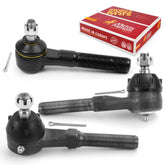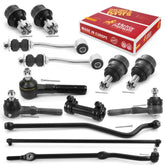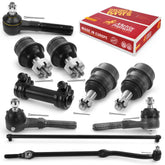What causes steering wheel vibrations, and how can I fix them?
The steering wheel in a vehicle is a circular device that the driver uses to navigate and maneuver by turning it left or right. If you experience steering wheel vibrations, it's crucial to address them promptly. These vibrations can be an indication of underlying issues with your vehicle, which can negatively affect your driving comfort, safety, and overall health of your vehicle. Take action immediately to ensure your safety and the well-being of your vehicle. Here are some common causes of steering wheel vibrations and how to fix them:
|
|
Cause |
Fix |
|
Wheel Imbalance
|
When the weight distribution on a wheel and tire assembly is uneven, it can lead to wheel imbalance. This can occur due to factors like uneven tire wear or damage to a wheel. |
Have your tires balanced by a professional. Balancing involves adding small weights to the rim to even out the weight distribution, eliminating vibrations.
|
|
Tire Issues |
Uneven tire wear, damaged tires, or a bent wheel can cause vibrations. Worn-out or damaged tires may also have irregularities in their tread patterns. |
Inspect your tires for visible damage or signs of uneven wear. Replace damaged or excessively worn tires. If the wear is uneven, consider a wheel alignment. Ensure your wheels are not bent or damaged, and replace them if necessary. |
|
Wheel Alignment Problems |
Incorrect wheel alignment can lead to steering wheel vibrations, especially if the wheels are not properly aligned in terms of camber, toe, or caster angles. |
Take your vehicle to a professional mechanic or alignment specialist for a wheel alignment. They will adjust the angles to ensure your wheels are correctly aligned. |
|
Brake Issues
|
Warped brake rotors can cause vibrations, especially when braking. Warping can occur due to overheating during heavy braking or other factors. |
Replace the warped brake rotors and consider having the brake pads and calipers inspected and serviced. |
|
Suspension Problems |
Worn-out or damaged suspension components, such as control arms, bushings, struts, or shocks, can result in vibrations. |
Have a professional mechanic inspect and replace any damaged or worn suspension components. Regular suspension maintenance can prevent future issues. |
|
Drivetrain Issues |
Problems in the drivetrain, such as worn-out CV joints or a damaged driveshaft, can transmit vibrations to the steering wheel. |
If you suspect drivetrain issues, consult a mechanic who can diagnose and repair the specific problem. |
|
Tire and Wheel Imbalance on Rear Wheels |
Sometimes, rear tire and wheel imbalance can transmit vibrations to the front of the vehicle and the steering wheel. |
Have the rear tires and wheels balanced as well to ensure a smooth ride. |
|
Axle Problems |
Bent or damaged axles can result in vibrations, especially during acceleration or at certain speeds. |
If you suspect an axle issue, consult a mechanic for an inspection and, if necessary, axle replacement. |
If you've been experiencing vibrations in your steering wheel, it's crucial to take action before the issue becomes worse. Ignoring the problem can lead to safety hazards and even further damage to your vehicle. You need a solution that you can trust, and that's where Metrix Premium Chassis Parts comes in. With our wide range of premium steering, suspension, and brake systems, you can have peace of mind knowing that your vehicle is in good hands. Don't wait any longer - get your vehicle inspected by a qualified mechanic and upgrade to Metrix Premium Chassis Parts for the highest quality and performance.









